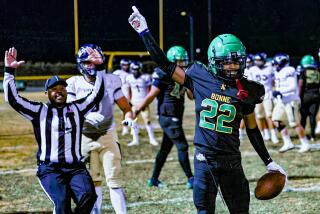Ivy League Image Hurt by Penn Forfeits
- Share via
PHILADELPHIA — Violations of football rules are supposed to be the stuff of the Auburns, Oklahomas and Texas Techs, not of Ivy League Penn.
The Ivy League has long tried to insulate itself from the dangers of big-time college football, going so far as to shun playoff games. But nothing can guard against all problems, as the Penn Quakers acknowledged last week when they forfeited five of their six wins because an All-Ivy defensive end played while academically ineligible.
A 6-4 season became a 1-9 debacle.
“It’s the first time in Penn’s history that it’s happened,” school spokesman Ken Wildes said. “We’re all disappointed about it, but it’s clearly human error. We believe the proper systems are in place. It’s just that someone made a mistake.”
Mitch Marrow, a fifth-year senior and late-round NFL draft prospect, started the semester with a full-time load of four classes. After a series of drops and adds, he ended up with just two--a part-time load. Marrow said he had no idea he was ineligible.
The school called the situation an inadvertent, isolated oversight--not an intentional pattern of breaking NCAA rules.
But for Penn, it is embarrassing, in part because it runs counter to the image the school has long sought to promote.
The Ivy League has always had stricter rules for football than other sports, said Kevin DeMarrais, former Columbia University sports information director, remembering the years he worked with Ivy League presidents. Until 1992, freshmen were barred from varsity and spring practices were banned.
“Even the Patriot League allows teams to go to tournaments, but the Ivies haven’t even considered it,” he said. “They want to stay above the fray. They don’t want to be tarnished with what goes on elsewhere.”
Penn, while acknowledging that the offense is serious, does point out that it is considered a secondary violation. And the infraction is not nearly as grave as problems witnessed at big-time programs--from player arrests to illegal gifts to point-shaving.
“To make this analogous to any of those other institutions would be a mistake,” Wildes said. “We want to play by the rules.”
While it is believed to be the first time an Ivy League program has forfeited games for breaking the rules, the league says this matter should not be interpreted as a sign.
“Putting it that way is saying either that you’re perfect or you’re a felon,” said Jeffrey Orleans, Ivy League executive director. “The hope is to be perfect if you can and catch yourself if you’re not.”
The lapse went undiscovered by Penn’s athletic department because an associate athletic director neglected to review weekly eligibility reports, a responsibility that had only recently become his.
Penn discovered the problem after Marrow’s mother called to find out if her son would graduate and to see if she could get a tuition refund.
The athletic department, incorrectly believing that Marrow could be reinstated if he added another class, scrambled to find a professor who would sign him up for an independent study course. The history department refused, but Kenneth Shropshire, a business professor and Penn’s NCAA liaison, agreed--two days before Penn’s final game against Cornell.
Penn won the game 33-20, but Marrow, suffering a nagging toe injury, played only the first quarter and made one tackle.
“It was his last game as a senior,” said athletic communications director Shaun May. “He wanted to play. He thought he could help us.”
An academic department panel finished its investigation last week and sent a letter to Orleans.
“Penn has maintained an unblemished record of managing its athletic programs by the book,” the panel wrote. “The incident detailed in this report is an unfortunate exception to that record.”
The university faulted Marrow and the athletic department for not monitoring his eligibility and blamed athletics officials for not telling Penn officials, the Ivy League or the NCAA immediately. The panel did not find fault with the athletic department’s effort to sign Marrow up for the independent study course.
Penn forfeited its wins against Columbia, Brown, Yale, Princeton and Cornell. Marrow, hampered all season by mononucleosis, made 21 tackles and three sacks in those five games. He finished the year with 30 tackles, good enough for his second-straight first-team All-Ivy honors.
The statistics and scores will stay on the record--with asterisks.
“It’s a penalty on paper,” quarterback Matt Rader said. “It won’t take away from anything we did on the field.”
The NCAA has sanctioned just two Ivy League schools since the conference was founded in 1956. Yale went on probation in 1970 for advising basketball player Jack Langer to play in the Maccabiah Games, violating a ban by the NCAA during a power struggle with the Amateur Athletic League, the event’s sponsor.
Cornell was put on probation for a year in 1974 when an alumnus improperly brought ice hockey recruits to a game in Boston. Later that year, the basketball team was cited for improper recruiting and unethical conduct, the NCAA said.
“I don’t think it’s really an issue of ‘These sorts of things aren’t supposed to happen at an Ivy League school,”’ Penn athletic director Steve Bilsky said. “You don’t want it to happen anywhere. It’s a blue moon at Penn. This has never happened before here.”
And, added May, “I don’t think it’ll ever happen again.”


